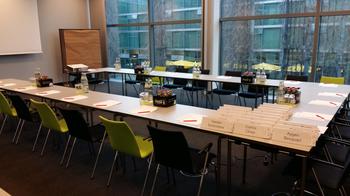Report: "Varieties of Punishment" – KFG Workshop on Regional Sanctions
Jun 08, 2017
Regional organizations (ROs) are increasingly active as senders of sanctions against their own members. This practice of suspending membership rights or imposing targeted measures breaks with old legacies of non-interference in domestic affairs. Moreover, the measures of regional organizations often overlap with the foreign policy sanctions of the European Union (EU), the United Nations (UN), and individual states. The interplay between emerging regional sanctions doctrines and conventional sanctions policies provides a crucial empirical opportunity for better understanding frictions and cooperation between plural political authorities on the international scene.
However, ROs display considerable variation in their approaches to sanctions. To judge the transformative potential of regional governance for international politics, explaining the increased activity of regional organizations in the field of sanctions is essential. To judge the potential impact of regional governance on domestic politics, explaining the idiosyncrasies displayed across the globe is equally indispensable.
On April 7-8, 2017, a group of scholars gathered in Berlin to discuss issues such as those outlined above. The KFG workshop ‘Varieties of Punishment’ was organized by KFG associated fellow Elin Hellquist, with the objective to initiate a mutually beneficial conversation between sanctions scholars and researchers of (comparative) regionalism.
The workshop started with a panel where we discussed the contributions by Boris Brekhov, Elin Hellquist, and Sascha Lohmann, which explore matters of legitimacy (Boris, Elin) and the relation between unilateral and regional sanctions (Sascha). Thereafter, we took on a set of papers by Christian von Soest and Fabian Bohnenberger, Carlos Closa, and Alberto Coll, which inquire into the underlying rationales of regional sanctions policies in Africa (Christian and Fabian) and the Americas (Carlos, Alberto). In the third panel, we turned to Mikael Eriksson and Peter Wallensteen’s analysis of sanctions and armed conflict, Francesco Giumelli’s argument about the legalization of EU foreign policy sanctions, and Stefano Palestini’s study of the re-definition of democracy-protecting sanctions in the Americas. The first day concluded with a paper by Inken von Borzyskowski and Felicity Vabulas on the consequences of membership suspension, and an exploration by Clara Portela on the interaction between UN and EU in the case of sanctions against Iran.
On the morning of the second day of the workshop we moved to the frontier between sanctions and other measures, as dealt with in the paper by Digdem Soyaltin and Aygen Becquart on the relation between EU and Council of Europe action in the case of Turkey, as well as in Ramūnas Vilpišauskas’ analysis of sanctions-like instruments in the field of EU fiscal rules. Our final panel was devoted to the non-use of sanctions, featuring Ulrich Sedelmeier’s account of party politics and sanctions within the EU, Lee Jones’ explanation of ASEAN’s uneven approach to sanctions as a matter of regime calculations, and Daniela Kroll and Kerstin Schembera’s study of reasons underpinning the EU’s and ASEAN’s unwillingness to use sanctions against members.
During our two-day meeting, we enjoyed lively discussions on a broad range of topics relating to regionalism and sanctions. Not only did we identify important themes of contention and commonality that will be helpful in advancing this emerging field of research, but we also had great conversations on high and low during our coffee breaks, lunches, and dinners. I would like to thank the KFG directors Tanja Börzel and Thomas Risse for their support and making this workshop possible, and Anne Morgenstern for an outstanding job in organizing the event!
Elin Hellquist
